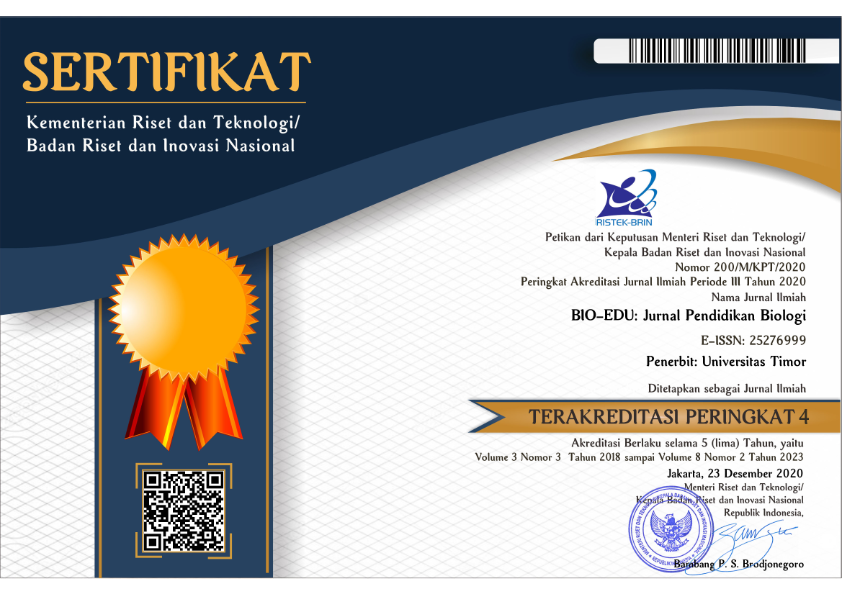The Effectiveness of the Problem Based Learning Model in Improving Collaborative Capabilities and Student Learning Outcomes in Class XI SMA
Efektifitas Model Problem Based Learning dalam Meningkatkan Kemampuan Kolaboratif dan Hasil Belajar Peserta Didik di SMA Kelas XI
Abstract
One of the skills that must be possessed by students in the 21st century is collaborative ability. Collaborative skills are abilities possessed by individuals in the form of groups to exchange thoughts or ideas and work together to achieve the expected goals. Increasing collaborative skills in students has a positive impact, namely producing more knowledge than just completing work independently and students can exchange ideas to be able to solve problems encountered in the learning process obtained.The efforts made in this study by applying the problem based learning (PBL) learning model to be able to improve collaborative abilities and learning outcomes learners. The use of the PBL learning model can improve scientific attitudes and student learning outcomes. The PBL model can improve learning outcomes and students' communication skills. The problem-based learning model can assist teaching staff in undergoing the learning process because it can improve student learning outcomes. Based on the background that has been formulated, the purpose of conducting this research is to determine the effectiveness of the PBL model in improving collaborative abilities and student learning outcomes in class XI reproductive system material.
References
Djaali., & Muljono. (2010). Pengukuran dalam Bidang Pendidikan. Jakarta : Grasindo.
Ekasari, Nirmala. 2021. Penerapan Metode Circuit Learning untuk Meningkatkan Hasil Belajar Siswa. Jurnal Pendidikan Indonesia, 2(2), 282-293. Retrieved from https://www.neliti.com/id/publications/339540/penerapan-metode-circuit-learning-untuk-meningkatkan-hasil-belajar-siswa
Greenstein, L. (2012). Assessing 21st Century Skills : A Guide to Evaluating Mastery and Authentic Learning. California : Corwin, A Sage Company.
Isma, T.W., Putra, R., Wicaksana, T.I., Tasrif,, E., & Huda, A. (2021).peningkatan Hasil Belajar Siswa melalui Problem Based Learning (PBL). Jurnal Ilmiah Pendidikan dan Pembelajaran, 6(1), 155-164. Retrieved from https://ejournal.undiksha.ac.id/index.php/JIPP/article/view/31523/21382
Mirdawati, Syamsuddin, A., & Rukli. (2022). Pengaruh Model Pembelajaran Problem Based Learning Berbantuan Media Mobile Learning Terhadapa Kemampuan Kolaborasi Matematika Siswa Kelas IV SD. Indonesian Journal of Educational Science, 5(1), 56-64. Retrieved from https://ojs.unsulbar.ac.id
Nadhiroh, P.S & Pujiriyanto. 2020. Keterampilan Kolaboratif Mahasiswa Teknologi Pendidikan dalam Mata Kuliah Kewirausahaan Berbasis Proyek. Jurnal Epistema, 1(1), 31-38. Retrieved from https://journal.uny.ac.id/index.php/epistema/article/view/32322/13713
Nelli, E., Gani, A., & Marlina. (2016). Implementasi Model Problem Based Learning pada Materi Kelarutan dan Hasil Kali Kelarutan untuk Meningkatkan Hasil Belajar dan Sikap Ilmiah Peserta Didik Kelas XI SMA Negeri 1 Peudada. Jurnal Penelitian Sains Indonesia, 4(2):12-23. Retrieved from https://www.neliti.com
Nurleni. (2022). Efektifitas Model Problem Based Learning (PBL) terhadap Hasil Belajar Ekonomi Peserta Didik SMAN 3 OKU. Jurnal Lentera Pedagogi, 5(2), 60-65. Retrieved from https://journal.unbara.ac.id/index.php/fkipakad
Nurwahidah., Samsuri, T., Mirawati, B dan Indriati. 2021. Meningkatkan Keterampilan Kolaborasi Siswa Menggunakan Lembar Kera Berbasi Saintifik. Reflection Journal, 1(2), 70-76. Retrieved from https://journal-center.litpam.com/index.php/RJ/article/view/556
Ramadhan, A., & Nadhira, A. (2022). Penelitian Tindakan Kelas (PTK) Solusi Alternatif Problematika Pembelajaran dengan Berbasis Kearifan Lokal dan Penulisan Artike Ilmiah sesuai dengan Kurkulum Tahun 2013 di Madrasah Tsanawiyah Darul Hikmah Medan. Jurnal Serunai Ilmu Pendidikan, 8(1),121-128. Retrieved from https://ejournal.stkipbudidaya.ac.id
Rizki, M.A., & Hidayati, S. N. (2021). Analisis Ketuntasan Hasil Belajar Pengetahuan Pada Materi Sistem Organisasi Kehidupan Di Smp Negeri 1 Sidoarjo Pada Masa Pandem. Pensa E- Jurnal, 9(3), 443-451. Retrieved from https://ejournal.unesa.ac.id/index.php/pensa
Sunbanu, H. F., Mawardi dan Wardani, K.W. 2019. Peningkatan Keterampilan Kolaborasi Siswa Menggunakan Model Pembelajaran Kooperatif Two Stay Twostray di Sekolah. Jurnal Basicedu, 3(4), 2037-2041. Retrieved from https://jbasic.org/index.php/basicedu/article/view/260
Susila, H.R & Qosim, A. (2022). Strategi Belajar dan Pembelajaran: untuk Mahasiswa FKIP. Banda Aceh: Syiah Kuala University Press.
Syah, M.N. 2016. Classroom Action Research as Professional Development of Teacher in Indonesia. Jurnal Pendidikan Islam. 13(1): 1-16. Retrieved from https://ejournal.unisnu.ac.id/JPIT/article/view/526
Tuti, K.N & Mawardi, M. 2019. Peningkatan Keterampilan Kolaborasi dan Hasil Belajar Siswa Mealui Penerapan Mopdel Teams Games Tournament pada Siswa Kelas 4 SD Negeri 05 Angan Tembawang. Jurnal Basicedu, 3(2), 320-325. Retrieved from https://jbasic.org/index.php/basicedu/article/view/9
Wulandari, N.I., Wijayanti, A., & Budhi, W. (2018). Efektifitas Model Pembelajaran Problem Based Learning terhadap Hasil Belajar IPA ditinjau dari Kemampuan Berkomunikasi Siswa. Jurnal Pilar MIPA, 13(1),51-55. Retrieved from https://jurnalfkip.unram.ac.id/index.php/JPM/article/view/538/pdf
Copyright (c) 2023 BIO-EDU: Jurnal Pendidikan Biologi

This work is licensed under a Creative Commons Attribution-ShareAlike 4.0 International License.
The Authors submitting a manuscript do so on the understanding that if accepted for publication, the copyright of the article shall be assigned to BIO-EDU: Jurnal Pendidikan Biologi and Departement of Biology Education, Universitas Timor as the publisher of the journal. Copyright encompasses rights to reproduce and deliver the article in all form and media, including reprints, photographs, microfilms, and any other similar reproductions, as well as translations.
BIO-EDU journal and Departement Biology Education, Universitas Timor, and the Editors make every effort to ensure that no wrong or misleading data, opinions, or statements be published in the journal. In any way, the contents of the articles and advertisements published in BIO-EDU are the sole and responsibility of their respective authors and advertisers.
Users of this website will be licensed to use materials from this website following the Creative Commons Attribution-ShareAlike 4.0 International License.


















